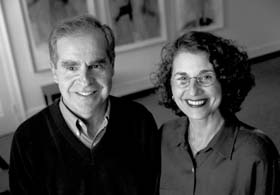
| ||
 | ||
 Professors Ben-Zion Dalfen and Evelyn Lusthaus PHOTO: OWEN EGAN |
Debut for disabilities seminar
|
BRONWYN CHESTER | As compared to their American counterparts, Canadian universities have little in the way of disabilities studies programs and McGill is no exception. True, the University has had an Office for Students With Disabilities since 1986 and there are internationally renowned scholars of certain disabilities, such as Laura Ann Petitto's work on sign language acquisition in the deaf and fellow psychologist Maggie Bruck's work on dyslexia (learning disabilities). The University also trains physio- and occupational therapists in the rehabilitation of disabled people, while students in the Faculty of Education take mandatory courses in teaching disabled pupils.
But when it comes to an overall and coordinated body of knowledge, research and teaching -- much like what's happened in such areas as women's and environmental studies -- the University just isn't there. At least not yet. That may soon change, thanks in part to a gift to the School of Social Work from the Edward Bronfman Family Foundation. The donation establishes a new annual seminar on disabilities and the $50,000 gift also helps pay for the graduate and undergraduate courses on disabilities offered by the school. It is the hope of the seminar coordinators, social work professor Ben-Zion Dalfen and education professor Evelyn Lusthaus, that the first seminar, to be held next Friday, will mark the beginning of a process of coming together for scholars, activists, students and caregivers who share an interest in issues related to disabilities. As Dalfen and Lusthaus point out, given that at least 10% of Canadians are disabled and given the aging nature of our population, most of us will either live with some disability or help care for someone with a disability at some point in our lives. "What I would like to see happen," says Lusthaus, program director for educational psychology and herself the mother of a developmentally disabled child, "is that disabled people are automatically included into society just like anyone else. We don't talk about special education anymore, we talk about inclusive education." Henry Enns, the executive director of the Canadian Centre on Disability Studies in Winnipeg, will be the keynote speaker at the seminar. At the age of 19, Enns was confined to a wheelchair as a result of rheumatoid arthritis and in his 20s spent considerable time in hospital -- all the while completing a BA and a BSW -- where he began developing his ideas regarding patients' rights and the importance of disabled people defining themselves, their needs and, to a large extent, looking after those needs. He is recognized internationally for his work in initiating Independent Living Centres -- resource centres managed and staffed by disabled people to help fellow disabled people live in the community, of which there are more than 20 across Canada. Others taking part in the conference include Joan Wolforth, coordinator of McGill's Office for Students with Disabilities, McGill social work professor Barry Trute, a family therapist specializing in the child disability field, Paul Gareau, executive director of the Montreal Association for the Blind, Peter Zwack of the Société québécoise de l'autisme, and Lusthaus. Quebec Lieutenant Governor Lise Thibault, herself a disabled person, will open the conference. Joan Wolforth likes the idea of the annual seminar. "Anything that raises awareness is a good thing because it's easy for people with disabilities to disappear." Wolforth is a firm advocate of an "if you build it, they will come" approach -- supply people with disabilities with the assistance they require in order to study or work, and they'll more than take advantage of the chance. But society has been slow to adopt this philosophy, she says. "Either we say their numbers are too small to warrant adaptations by institutions or we say [the adaptations] will cost too much." She thinks McGill's own experience demonstrates how things can improve. Wolforth's office has a clientele of 350 students -- more than 100 times the number it began with in 1986. The integration of disabled children into regular schools, the increase in support services at the University, the increased awareness of faculty and student support services and new technological advances have made an increasing number of disabled students welcome at McGill. Dalfen developed a successful program aimed at helping intellectually handicapped workers improve their ability to get and retain jobs and he is now adapting it to adults with learning disabilities. He agrees with Wolforth -- investments in technologies or approaches that help provide a more level playing field for people with disabilities ultimately pay off. It was only in 1989, after Dalfen lobbied the University to install an elevator in the School of Social Work, that a physically disabled student was able to study social work at McGill. Today, between five and eight disabled students enter the school each year. The conference is open to the public. It will be held Friday, June 5, 1998 at Redpath Hall. The cost is $35 which includes lunch. For more information, please phone 398-7070.
|
|
| |||||